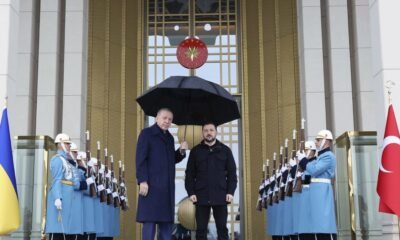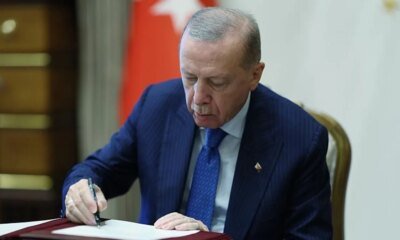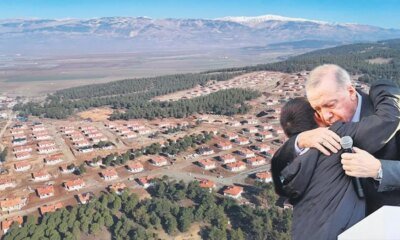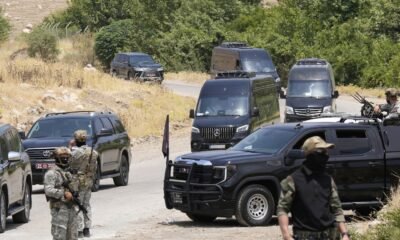Politics
Istanbul mayor named culprit in 7 counts of money laundering
The Financial Crimes Investigation Board (MASAK) has issued a report accusing Istanbul’s jailed Mayor Ekrem Imamoğlu of seven counts of laundering ill-gotten assets.
Imamoğlu, along with Tuncay Yılmaz, general manager of Imamoğlu Construction Company, is suspected of laundering 25 immovable properties, TL 63.5 million ($1.6 million) and 637,106 euros ($731,078), MASAK said in the report released Wednesday.
Imamoğlu, along with 12 other suspects, was arrested in March as part of a wider corruption investigation involving Istanbul municipality officials, as well as employees of his family company.
The seven counts of laundering range from illicit real estate purchasing contracts and unlawful sale of immovable properties to covering up money transactions by pushing sums through various personal and corporate bank accounts and cash submissions by individuals with red-flagged financial profiles.
MASAK said the investigation was expanded to include Yılmaz, Imamoğlu Construction Company, SSB Real Estate Industry and Trade Inc. and Güllüce Agriculture Industry and Trade Inc.
The board detected TL 35.2 million in the bank accounts of Imamoğlu Construction Company, all of which was submitted in cash and whose source could not be determined. The company paid TL 7 million for three apartments sold in a construction project and for a villa whose title deed was not transferred to the alleged buyer.
The board also found irregularities in the transfer of Güllüce Agriculture shares owned by suspect Ali Nuhoğlu, who was released after pleading effective repentance, to Imamoğlu’s construction company.
It said the Güllüce company and the two villas were sold to Imamoğlu’s company for a sham price in an unlawful contract, which included “perfunctory articles to conceal the true price.”
According to the board, Imamoğlu and the companies involved supplied financing with high sums whose origins could not be traced and registered in the current accounts differently from the normal process. They also made a purchase strongly suspected to be prearranged look like a commercial purchase and even created an invoice that was recorded in the company’s legal books.
All of these were preceded by accounting tricks in commercial records, the report said.
The report also included testimonies from some suspects in the case.
Furkan Hamzaoğlu, a construction company owner and one of the suspects in the case, alleged he gave away shops and apartments to Adem Soytekin, another businessperson arrested alongside Imamoğlu, to obtain a construction license in Istanbul’s Beylikdüzü district. He claimed four of these apartments were transferred to the ownership of Imamoğlu’s father, Hasan Imamoğlu.
Politics
Türkiye sustains aid to Gaza as plight of Palestinians deepens
Since the new round of Palestine-Israel conflict began in October 2023, Türkiye has delivered more than 101,000 tons of humanitarian aid to the Palestinian enclave of Gaza.
Among it is more than 25,000 tons of food aid, 3,171 tons of drinking water and 25,180 tents.
Türkiye also hosted 430 patients evacuated from Gaza as health care facilities in the enclave are heavily damaged in Israel’s reckless attacks. In addition, in cooperation with the United Nations Relief and Works Agency for Palestine Refugees in the Near East (UNRWA), the country delivered more than 65,000 tons of flour to Palestinians. The Disaster and Emergency Management Presidency (AFAD) leads the humanitarian efforts for Gaza.
Anadolu Agency (AA) reported that Türkiye has sent 14 planes and 16 vessels loaded with aid to Gaza so far and has also sourced aid materials from the Palestinian territories to be delivered to the enclave.
A total of 25,729 tons of food, 3,171 tons of drinking water, 351 containers turned into temporary shelters, 113,608 blankets, 25,180 tents, 19,798 sleeping bags and 151,445 pieces of shelter material, along with three mobile kitchens, have been delivered to Gaza. Additionally, 469,486 pieces of clothing and 1,083 toy sets for children were sent.
The total amount of humanitarian aid materials, sent via ship voyages, an air bridge, local procurement and in cooperation with UNRWA, has reached 101,271 tons.
Within the scope of medical aid, eight field hospitals, 53 ambulances and 247.5 tons of medical supplies have been sent to Gaza.
To improve hygiene conditions in the region, 281,238 hygiene kits and 550 tons of hygiene materials have been distributed. Aid supplies also included one forklift and 1,451 generators for energy needs.
Under the coordination of the Ministry of Health, 430 patients and 450 caregivers were transported to Türkiye via nine flights.
Of the 1,369 individuals brought to Türkiye from Gaza through an evacuation operation carried out by the Ministry of Foreign Affairs, 1,229 were provided with accommodation and food services in Istanbul.
Currently, a total of 1,834 people from 613 families have been provided with housing in Ankara, Istanbul, Konya and various other provinces. Cash support was also provided by the Ministry of Family and Social Services and the AFAD through Esenkart cards.
A total of $7.5 million was donated to the Egyptian Red Crescent, with $7 million from the AFAD and $500,000 from the Turkish Red Crescent.
Furthermore, $3 million in financial support was provided for the sea logistics of 30,000 tons of flour, which is being delivered in cooperation with the AFAD and UNRWA.
In the coming period, approximately 250 tons of fuel are planned to be sent to Gaza as fuel support, procured locally.
At least 61,258 Palestinians have been killed in Israel’s genocidal war on the Gaza Strip since October 2023, including 197 who have died from hunger, Gaza’s Health Ministry said on Thursday.
A ministry statement said 100 bodies were brought to hospitals in the last 24 hours, while 603 people were injured, taking the number of injuries to 152,045 in the Israeli onslaught since October 2023.
The ministry also said that four more people died from starvation and malnutrition over the past day, pushing the death toll since October 2023 to 197, including 96 children.
A medical source told AA that 16-month-old Mohammed Zakaria Asfour lost his life at the Nasser Medical Complex in Khan Younis as a result of starvation-related complications amid a severe shortage of food and medicine due to the Israeli siege.
Activists shared videos on social media showing Mohammed’s extremely frail body and protruding bones.
The ministry also said that 51 Palestinians were killed and 230 injured while trying to get humanitarian aid in the past day, bringing the total number of people killed while seeking aid to 1,706, with over 12,030 others wounded since May 27, when the controversial Gaza Humanitarian Foundation began operations.
Israel has imposed a blockade on Gaza for 18 years and, since March 2, has shut down all crossings, blocking the entry of humanitarian aid and worsening conditions for the territory’s 2.4 million population.
According to Gaza’s government media office, Israel allowed just 92 aid trucks on Wednesday, far short of the 600 trucks needed daily to meet the needs of the residents.
The Israeli army resumed its attacks on the Gaza Strip on March 18, breaking a cease-fire and prisoner exchange agreement that took hold in January. Efforts for another truce, led by the U.S., Egypt and Qatar, have so far not yielded any results.
Politics
Türkiye, Senegal eye enhancing cooperation as PM visits Ankara
President Recep Tayyip Erdoğan on Thursday received Senegalese Prime Minister Ousmane Sonko at the Presidential Complex in Ankara.
Sonko was personally invited to Türkiye by Erdoğan as the two countries seek ways to improve ties. Sonko and Erdoğan were scheduled to sign several cooperation agreements after discussing relations, regional and global issues, the Presidency’s Directorate of Communications said earlier.
Developing relations and cooperation with African countries is one of the cornerstones of Ankara’s multidimensional foreign policy.
Türkiye’s engagement with the African continent has been gaining pace over the years. Since assuming office nearly two decades ago, first serving as prime minister, Erdoğan has been fostering ties with Africa, presenting Türkiye as a fairer player than the continent’s former colonial powers.
Ankara has emphasized its desire to advance relations with the continent based on a win-win relationship and equal partnership while maintaining mutual respect. Both sides have been vowing to tap into their greater potential for further expanding and deepening relations.
The Turkish Embassy in Dakar, which was established in 1962, is one of the first Turkish diplomatic missions on the African continent.
Senegal, which gained independence from France in 1960, stands out in West Africa owing to its stability and institutionalized democracy.
In 2018, Erdoğan paid an official visit to Senegal, accompanied by several Cabinet ministers, and Senegal’s then-President Macky Sall visited Istanbul for the opening of the Çamlıca Mosque in 2019.
Erdoğan paid another official visit to Senegal in 2020, which included a business forum. Private sector representatives annually hold business forums in Senegal.
Economic cooperation with Türkiye is key for indebted Senegal, which unveiled an economic recovery plan on Aug. 1. The West African country faces a deteriorating economy, marked by a 14% budget deficit and outstanding public debt that represents 119% of GDP, said Senegal Economy Minister Abdourahmane Sarr at the ceremony to unveil the plan. At the same event, Sonko declared that under the new economic plan, “90% of resources are expected to come from the mobilization of internal resources and without external debt”.
President Bassirou Diomaye Faye and Sonko claim to have inherited a heavy burden from their predecessor, President Macky Sall.
Politics
Azerbaijan, Armenia leaders to meet in Washington for peace talks
U.S. President Donald Trump will host the leaders of Armenia and Azerbaijan for peace talks at the White House on Friday, a U.S. official said on Thursday.
The official told Reuters it was possible that the framework for a peace agreement could be announced at Friday’s meeting. The Washington Post was the first to report on the talks.
Armenia also confirmed the talks. The trilateral meeting is “aimed at promoting peace, prosperity and economic cooperation in the region,” the government said in a statement posted on its Telegram messaging app.
Armenian Prime Minister Nikol Pashinyan, who is travelling to Washington on Aug. 7-8, will also hold a bilateral meeting with Trump, the statement said.
In March, the two sides announced that they had agreed on the text of a draft peace agreement; however, progress has been sporadic and slow since then. The countries’ leaders met in July in Abu Dhabi for talks. Azerbaijan has previously said that Armenia must change its constitution to remove indirect references to Karabakh’s “independence” before signing a peace treaty. Yerevan denies this, but Pashinyan has repeatedly stressed, most recently this week, that the South Caucasus country’s founding charter needs to be updated.
Relations between Baku and Yerevan have been tense since 1991, when the Armenian military occupied Karabakh, a territory internationally recognized as part of Azerbaijan and seven adjacent regions, including Lachin.
Most of the territory was liberated by Azerbaijan during a 44-day war in the fall of 2020, which ended after a Russian-brokered peace agreement that opened the door to normalization talks and the demarcation of their border.
After a series of slow-moving negotiations, Azerbaijan rushed in troops last year in September and swiftly seized back Karabakh, whose entire population of nearly 120,000 people returned to Armenia after rejecting a reintegration program Baku offered.
Earlier in 2024, Armenia withdrew from several Azerbaijani villages it had controlled since the early 1990s as part of the peace process.
Politics
AK Party launches campaign for Century of Türkiye, terror-free plan
Two deputy chairpersons of the ruling Justice and Development Party (AK Party) held a news conference on Wednesday in Ankara to introduce a new campaign that will continue until September. The campaign is entitled “Century of Türkiye Meetings” and aims to promote the titular set of reforms unveiled by President Recep Tayyip Erdoğan ahead of the centenary of the Republic of Türkiye in 2023. In addition, the meeting will bring together AK Party staff from 81 provinces and the public as part of an outreach effort about the terror-free Türkiye initiative.
Ahmet Büyükgümüş, deputy chairperson of the party, said they attach importance to communicating with the public about the services that AK Party governments have provided since they first came to power in 2002. “We will launch a series of events throughout August and September about what is done with the vision of Century of Türkiye in 81 provinces and 973 districts,” he said.
“Century of Türkiye” is a comprehensive list of goals aimed at boosting Türkiye’s global standing, encompassing reforms in public services, health care, education, transportation, energy, agriculture and tourism, as well as targets to enhance the country’s diplomatic influence in global affairs.
The party’s deputy chairs and ministers will lead AK Party delegations to events held in provinces and districts and they will also meet with opinion leaders in each province. The campaign will conclude with a final event in Istanbul, attended by representatives of nongovernmental organizations (NGOs).
“We are engaged in politics at a time of a very important agenda for Türkiye and a significant transformation in the world. Therefore, developments regarding the terror-free Türkiye initiative and its details will be shared with our nation. We will conduct field trips to explain its meaning and how the initiative will advance,” he said.
The terror-free Türkiye initiative launched by government ally Nationalist Movement Party (MHP) leader Devlet Bahçeli had its first tangible progress in February when the terrorist group PKK’s jailed ringleader, Abdullah Öcalan, accepted Bahçeli’s call and urged the group to lay down its weapons. In May, the PKK announced it would dissolve itself. Last month, some 30 PKK members, including a senior leader, burned their weapons in a ceremony in northern Iraq. Although symbolic, the gesture marked the first time that the group had laid down arms in its campaign of violence for more than four decades. The PKK has previously announced so-called unilateral truces but has never entirely given up its ambitions.
On Tuesday, a parliamentary committee established exclusively to tackle the initiative held its first meeting, marking another milestone in the process. The committee will examine the fine details of the initiative and provide recommendations to Parliament on advancing the initiative with new regulations. This may or may not include lenient sentences for former members of the terrorist group and a legal framework regarding the status of the terrorist group.
As part of the campaign, the AK Party’s women’s branch will visit families of terror victims and veterans of counterterrorism operations, presenting a letter from President Erdoğan addressed to them in the context of the terror-free Türkiye initiative.
Büyükgümüş said they would also inform the public on the government’s efforts to ensure a permanent drop in inflation. “Under the leadership of President Erdoğan, all relevant ministries endeavor to maintain a fall in inflation and improve welfare. As AK Party cadres, we will inform the public about the point we reached on this matter and future steps,” he said. Inflation dropped more than expected in July to reach its lowest level in almost four years, according to official data released on Monday, which officials say reinforces their forecasts that price growth will slow further by year-end. The increased cost of living and instances of overpricing by certain businesses are major economic challenges for the country, and some political pundits attribute this to the drop in votes for the AK Party in the 2024 municipal elections.
He stated that they would also share details of the government’s National Technology Movement, “which became more significant amid recent geopolitical tensions.” “We will inform the public about steps taken for domestic production and services in the defense industry, digital infrastructure and energy,” he said.
Politics
Senegal’s PM Sonko to visit Türkiye, discuss cooperation
Senegal’s Prime Minister Ousmane Sonko will visit Türkiye on Wednesday at the invitation of President Recep Tayyip Erdoğan and discuss bilateral cooperation as well as regional issues, the Directorate of Communications said in a statement.
“In the talks to be held on Thursday, Aug. 7, bilateral relations between Türkiye and Senegal will be discussed in all their aspects and steps to deepen cooperation at the strategic partnership level will be evaluated,” Communications Director Burhanettin Duran said on social media.
Regional and international issues will also be on the agenda of the two leaders, Duran added, saying that agreements to strengthen ties between Türkiye and Senegal are expected to be signed during the visit.
Developing relations and cooperation with African countries is one of the cornerstones of Ankara’s multidimensional foreign policy.
Türkiye’s engagement with the African continent has been gaining pace over the years. Since assuming office nearly two decades ago, first serving as prime minister, Erdoğan has been fostering ties with Africa, presenting Türkiye as a fairer player than the continent’s former colonial powers.
Ankara has emphasized its desire to advance relations with the continent based on a win-win relationship and equal partnership, while maintaining mutual respect. Both sides have been vowing to tap into their greater potential for further expanding and deepening relations.
The Turkish Embassy in Dakar, which was established in 1962, is one of the first Turkish diplomatic missions on the African continent.
Senegal, which gained independence from France in 1960, stands out in West Africa owing to its stability and institutionalized democracy. Muslims comprise 96% of its 16 million population. Most people, such as those affiliated with the Muridiyya, Qadiriyya and Tijaniyyah, are devout followers of Sufi orders. This has prevented extremist elements from influencing the country’s Muslim population.
As part of its foreign policy toward the continent, Türkiye increased the number of its embassies in Africa from 12 in 2002 to 44 by 2024.
African countries also increased their embassies in Türkiye, and the number of African embassies in Ankara rose from 10 in 2008 to 38 in 2024.
Ankara’s increasing diplomatic presence on the continent has led to stronger ties, particularly in political, economic and cultural areas. The number of mutual visits in the past five years has exceeded 500.
Erdoğan has made 53 visits to 31 African countries, making him the leader who has visited the continent most often.
Politics
Activists in Türkiye to back multinational Gaza-bound aid flotilla
Activists and civil society groups in Türkiye announced Wednesday they will support the Global Resolve Flotilla, a multinational effort preparing to sail for the Gaza Strip in a bid to break Israel’s blockade, which has worsened humanitarian conditions in the enclave.
The flotilla, which will set sail from Spain on Aug. 31 and from Tunisia on Sept. 4, aims to deliver humanitarian aid directly to Gaza, raise global awareness of the Palestinian plight and spotlight what organizers call Israel’s “systematic genocide.”
At a news conference hosted by the Ummah Movement Association, Turkish delegation spokesperson Hüseyin Durmaz said that the initiative unites more than 40 countries from Europe, Africa, Asia, Latin America and the Arab world.
“Preparations are underway for volunteers and activists from diverse backgrounds to join this mission from Türkiye,” Durmaz said. “This is not limited to local efforts; it has become a global solidarity movement with support pouring in from around the world.”
The civilian-led mission will carry food packages, baby formula, medical supplies and other essential goods. Organizers say the effort is entirely peaceful and non-violent. More than 6,000 activists from 44 countries have already registered online to participate in the event.
Durmaz stressed that the flotilla’s multinational composition underscores its independence and grassroots nature.
“This is a concrete step toward sustaining the momentum of global movements, effectively challenging the blockade on Gaza and strengthening solidarity among peoples,” he said.
Israel’s blockade of Gaza, imposed since 2007, has been condemned by Türkiye and many in the international community as a form of collective punishment. The restrictions have severely limited humanitarian access, contributing to widespread shortages and famine-like conditions in the besieged Palestinian territory.
The Global Resolve Flotilla is the latest in a series of international maritime missions challenging the blockade, echoing previous attempts that drew global attention to the humanitarian crisis in Gaza.
It follows days after Israeli naval forces intercepted the Handala aid ship on July 26 as it neared Gaza, escorting it to Ashdod Port.
Rejecting repeated calls for a cease-fire, Israel has continued its military assault on Gaza since Oct. 7, 2023, killing nearly 61,000 Palestinians, almost half of them women and children and devastating the enclave’s infrastructure.
The International Criminal Court (ICC) in November issued arrest warrants for Israeli Prime Minister Benjamin Netanyahu and former Defense Minister Yoav Gallant for war crimes and crimes against humanity. Israel also faces a genocide case at the International Court of Justice (ICJ).
“This is a renewed attempt to pressure governments by sending dozens of ships and thousands of activists to break Gaza’s blockade,” said organizer Seif Abu Keshk at a news conference in Tunis, noting that participants will undergo training and solidarity events at departure points before setting sail.
-

 Politics2 days ago
Politics2 days agoErdoğan to visit Ukraine, free trade on agenda: Envoy
-

 Daily Agenda3 days ago
Daily Agenda3 days agoHalf of us and hearts are comfortable nests peaceful
-

 Sports2 days ago
Sports2 days agoBengisu Avcı makes Turkish sports history by conquering Ocean’s 7
-

 Economy2 days ago
Economy2 days agoArgentina’s Milei vetoes pension, disability spending hikes
-

 Daily Agenda2 days ago
Daily Agenda2 days agoThe Chief of General Staff changed with the age decision
-

 Daily Agenda3 days ago
Daily Agenda3 days agoBrand new Kahramanmaraş with the power of the state in 2.5 years
-

 Economy24 hours ago
Economy24 hours agoPublic land formula essential for transformation
-

 Refugees2 days ago
Refugees2 days agoTurkish parliamentary committee begins work on PKK peace initiative




